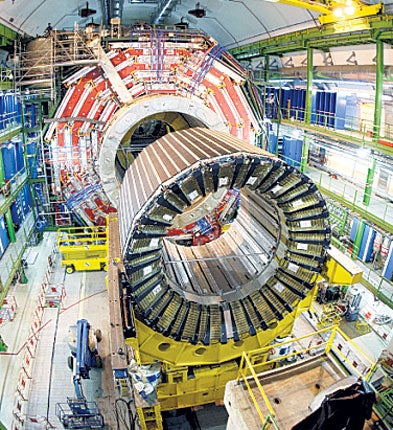We may not have found the God particle after all...

Its discovery could be the greatest achievement in nuclear physics this century, but scientists are urging caution over tantalising evidence suggesting that they may have found the elusive "God particle".
Speculation about the possible discovery of a sub-atomic particle known as the Higgs boson by physicists at Europe's underground atom-smasher experiment is premature, according to the director-general of the European Organisation for Nuclear Research (Cern) near Geneva.
Professor Rolf Heuer said yesterday that his scientists have detected "intriguing fluctuations" in the data gathered by Cern's Large Hadron Collider (LHC), which is searching for the elusive subatomic particle, predicted by theorist Professor Peter Higgs of Edinburgh University in the 1960s but so far never detected.
But Professor Heuer cautioned that the data fluctuations detected by Cern scientists may turn out to have nothing to do with the Higgs and may even be random statistical "noise" generated when high-energy beams of protons are crashed together within the LHC at velocities that fall just short of the speed of light.
The Higgs is predicted to confer mass to other sub-atomic particles and matter. If it exists the LHC is powerful enough to detect it, but researchers have first to eliminate any random fluctuations that could interfere with their observations.
"Don't expect too much too quickly... You have to be careful about combining small numbers because you can easily be fooled," Professor Heuer said at an international meeting of physicists in Grenoble to review the LHC's first few months of gathering data. "I hope the first big discovery will come next year, namely the discovery of the Higgs boson. I have learned in life to be patient, something will come," he said.
It is still possible that the particle may not actually exist, but this will mean that physicists will have to abandon their fundamental theory of how the many different kinds of subatomic particles interact with one another as part of a basic set of rules and understanding known as the Standard Model.
Two experiments attached to the LHC, called Atlas and CMS, are both detecting interesting fluctuations in the "low mass" region of energy levels where the Higgs could exist, Professor Heuer said. However, so far the evidence is still equivocal and is unlikely to be strong enough to confirm or refute the existence of the Higgs until the end of 2012, he said.
"I think towards the end of next year we'll have the answer. The Higgs is not like any other subatomic particle. The difference is that with the Higgs we know everything about it, but whether it exists," said Professor Heuer, adding: "We are still missing the Higgs boson, the key particle of the Standard Model. If we find it, the Standard Model is complete, and if we don't find it, then the Standard Model has a problem."
Subscribe to Independent Premium to bookmark this article
Want to bookmark your favourite articles and stories to read or reference later? Start your Independent Premium subscription today.

Join our commenting forum
Join thought-provoking conversations, follow other Independent readers and see their replies